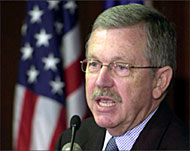UN: US stifled Iraq arms probe
United Nations arms inspectors have complained that a lack of cooperation by the United States had stymied their efforts to completely account for Iraqi weapons.

The latest quarterly report by the UN Monitoring, Verification and Inspection Commission, known as UNMOVIC, says Washington never gave the commission a copy of US inspector David Kay’s findings on Iraqi weapons, and it failed to seek any UN information for Kay’s team.
UN inspectors withdrew from Iraq a year ago, shortly before the US-led invasion of the country.
After the war, the US deployed its own team under Kay and refused to allow UN inspectors to return.
Kay’s team concluded that Iraq did not have stockpiles of banned weapons as alleged by President George Bush in making his case for war.
“During the period under review, no official information was available to UNMOVIC on either the work of, or the results of, the investigations of the United States-led Iraq Survey Group in Iraq. Nor has the (US) survey group requested any information from UNMOVIC,” the UN report said.
It sets out Kay’s findings that it was unlikely large stockpiles of chemical and biological weapons were deployed in Iraq after 1994, but makes no comment on them.
The report also said it was hoping for more cooperation from the new US search team, led by Charles Duelfer, who was formerly the deputy chairman of the UN inspectors and replaced Kay in January.
Permanent role
 |
|
UNMOVIC says US never gave it |
Demetrius Perricos, acting executive chairman of UNMOVIC, said the agency now hoped to get a copy of Duelfer’s findings.
“The commission hopes that this report will be provided to it,” he said.
The UN group, seeking a permanent role in monitoring arms programs internationally, is hoping to complete its accounting of Iraqi arms as a model for future investigations.
The UNMOVIC report urges the UN Security Council to set a “time frame” to discuss UNMOVIC’s future before expert staff, now down to just 51 people in New York, leave for other jobs.
“Trained and experienced experts once dispersed are difficult to reassemble at short notice,” it said.
Lessons learned
UNMOVIC said it was preparing a compendium of lessons learned in Iraq. One focus will be on analysing how Iraq gradually developed banned weapons of mass destruction from 1973 to 1991, the report said.
“During the period under review, no official information was available to UNMOVIC on either the work of, or the results of, the investigations of the United States-led Iraq Survey Group in Iraq. Nor has the (US) survey group requested any information from UNMOVIC” UNMOVIC report |
Iraq also established elaborate networks of front companies to obtain materials. The compendium would attempt to chart a financial and organisational infrastructure established to support this network both inside and outside Iraq.
Despite being barred from Iraq, UNMOVIC said it has been reviewing plans for the ongoing monitoring and verification of Iraq’s chemical, biological and missile programs, gathering information from public material and post-war commercial satellite imagery.
It said many items on a list of goods with possible military uses that Iraq could only import with special permission had not been updated since 1995.
Problems
The UN inspectors were banned from Iraq in 1998 after a US bombing raid and did not return until invited back under US and UN pressure in late 2002 in the run-up to war.
The report cites several problems inspectors were unable to resolve before they left.
These include an aluminium part possibly intended for a chemical warhead, a mold intended to produce a cluster warhead for a rocket, and steel spheres designed for use in a cluster bomb.
But UNMOVIC, in all its reports, has never alleged that Iraq still maintained a stockpile of dangerous weapons as the Bush administration did before the war.